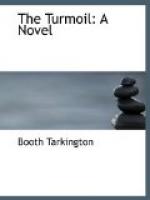“The thought of going down there—into the money shuffle—I hate it as I never hated the shop!” he said. “I hate it! And the city itself, the city that the money shuffle has made—just look at it! Look at it in winter. The snow’s tried hard to make the ugliness bearable, but the ugliness is winning; it’s making the snow hideous; the snow’s getting dirty on top, and it’s foul underneath with the dirt and disease of the unclean street. And the dirt and the ugliness and the rush and the noise aren’t the worst of it; it’s what the dirt and ugliness and rush and noise mean—that’s the worst! The outward things are insufferable, but they’re only the expression of a spirit— a blind embryo of a spirit, not yet a soul—oh, just greed! And this ‘go ahead’ nonsense! Oughtn’t it all to be a fellowship? I shouldn’t want to get ahead if I could—I’d want to help the other fellow to keep up with me.”
“I read something the other day and remembered it for you,” said Mary. “It was something Burne-Jones said of a picture he was going to paint: ’In the first picture I shall make a man walking in the street of a great city, full of all kinds of happy life: children, and lovers walking, and ladies leaning from the windows all down great lengths of a street leading to the city walls; and there the gates are wide open, letting in a space of green field and cornfield in harvest; and all round his head a great rain of swirling autumn leaves blowing from a little walled graveyard.”
“And if I painted,” Bibbs returned, “I’d paint a lady walking in the street of a great city, full of all kinds of uproarious and futile life—children being taught only how to make money, and lovers hurrying to get richer, and ladies who’d given up trying to wash their windows clean, and the gates of the city wide open, letting in slums and slaughter-houses and freight-yards, and all round this lady’s head a great rain of swirling soot—” He paused, adding, thoughtfully: “And yet I believe I’m glad that soot got on your cheek. It was just as if I were your brother—the way you gave me your handkerchief to rub it off for you. Still, Edith never—”
“Didn’t she?” said Mary, as he paused again.
“No. And I—” He contented himself with shaking his head instead of offering more definite information. Then he realized that they were passing the New House, and he sighed profoundly. “Mary, our walk’s almost over.”
She looked as blank. “So it is, Bibbs.”
They said no more until they came to her gate. As they drifted slowly to a stop, the door of Roscoe’s house opened, and Roscoe came out with Sibyl, who was startlingly pale. She seemed little enfeebled by her illness, however, walking rather quickly at her husband’s side and not taking his arm. The two crossed the street without appearing to see Mary and her companion, and entering the New House, were lost to sight. Mary gazed after them gravely, but Bibbs, looking at Mary, did not see them.




